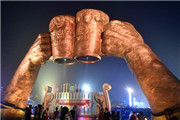China's latest high-speed train consumes only 3.8 KWh per 100 passenger-km
( en.people.cn )
Updated: 2017-09-29
|
|||||||||

China's latest high-speed train the Fuxing consumes only 3.8 KWh per 100 passenger-km when running at a speed of 350 km/h, according to Chinese newspaper Science and Technology Daily.
Fuxing bullet trains officially started operating at 350 km/h since Sept 21, which has made China to reclaim its crown for the world's fastest train service.
The height of the Fuxing model CR400AF increased to 4.05 meters from 3.7 meters, expanding its section by 7.3 percent.
The enlarged locomotive calls for improved aerodynamic performance. In order to achieve this, the design team conducted lots of simulated calculations, wind tunnel tests, and moving model tests, said Ding Sansan, deputy chief-engineer of CSR Qingdao Sifang Co., Ltd., the producer of the locomotive.
After multiple technical evaluations, the final scheme was chosen out of 46 preliminary conceptual plans.
Compared with older versions of China's high-speed trains, the Fuxing has 12 percent lower air resistance and 17 percent of the energy consumption per 100 km.
It saves more than 5,000 KWh of electricity for a round trip between Beijing and Shanghai, Ding noted.
In addition, a number of sensing systems have been added to the train, empowering it with a smarter brain.
The 2,500 sensors can sample more than 1,500 kinds of information, including vibration, bearing temperature, traction system, and carriage environment, said Tao Guidong, deputy director of technical center of CSR Qingdao Sifang Co., Ltd.
The smart high-precision sensing systems are able to sample one million pieces of data in just one second, Tao added.
The Fuxing bullet train has also applied passive safety technology for the first time. The technology, which uses energy absorption devices, guarantees the non-deformation of passenger in the event of a crash, Ding noted.




